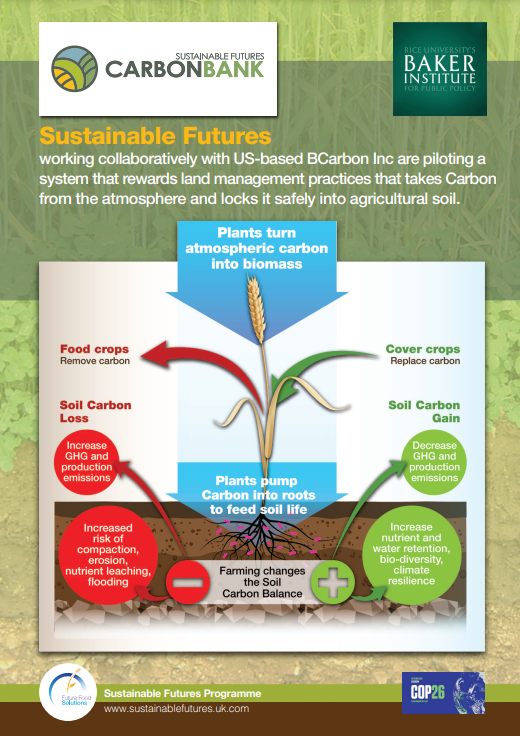
Finalist: Achieving Net Zero
Making the UK food and drink supply chain sustainable
Yorkshire, UK
The Challenge
According to the UK’s Environment Agency, UK soil contains about 10 billion tonnes of carbon, roughly equal to 80 years of annual greenhouse gas emissions. Carbon sequestration is the long-term storage of carbon dioxide (CO2) present in the atmosphere. Farm crops naturally sequester carbon through photosynthesis and store it as soil organic carbon.
But more frequent thunderstorms and flooding, as well as intensive agriculture has caused arable soils to lose 40 to 60% of their organic carbon. Farmers manage 70% of the land in the UK and have a key role to play to store more carbon in the soil, and help the UK food and drink supply chain achieve net zero.
The Innovative Project
The Sustainable Futures Carbon Bank, which is being piloted in Yorkshire, aims to incentivise more farmers to use some of their land for sequestering carbon. Using a system of sampling, analysis, and validation, specifically designed to detect changes in soil carbon, the scheme provides the opportunity to convert every tonne of carbon removed from the atmosphere, that contributes to measurable soil carbon gain, into certified carbon credits.
The Carbon Bank will create a new income stream for farmers as the carbon they store can be traded as certified carbon credits to offset emissions from supply chain partners like food, drink and even utility companies. These new commercial drivers will quickly encourage uptake in regenerative farming, reduced supply chain emissions and facilitate the carbon drawdown essential for fixing our climate.
The partnership has also released a Good Soil Guide, which farmers can add their own soil knowledge and stories to.
The Partnership
Inspired by BCarbon’s Texas carbon market from Rice University’s Baker Institute for Public Policy in Houston, supply chain specialists Future Food Solutions Ltd joined forces with the University of Leeds, University of Hull and Newcastle University to apply the idea of carbon sequestration and carbon credits to a UK market.
They also worked with Sustainable Futures, who are engaging large brands and their supply chains to improve sustainability and reduce the impact of those supply chain activities on the environment. And Sustainable Landscapes has brought together farmers working collectively to improve soil health, water quality, diversity and sequestrate carbon in Yorkshire.
Others partners include:
-
Yorkshire Wildlife Trust
-
The Rivers Trust
-
The Woodland Trust
-
Yorkshire farm businesses (majority being small and medium enterprises)
-
Yorkshire Water – Utility company
-
Environment Agency UK
The Impact
The Sustainable Futures Carbon Bank has engaged 500 farm businesses in the programme, as well as food and drink manufacturers and their supply chains.
By improving soil organic matter and sequestrating carbon from the atmosphere, soil fertility is improved, biodiversity is enhanced so nature is supported. Better soil health improves crop nutrition and food quality; enhances air quality and reduces greenhouse gas emissions; safeguards water quality and helps to prevent flooding, erosion and landscape degradation; has a positive impact on biodiversity and ecosystem resilience; and promotes the health and well-being of every component of the farmed landscape. Farmers being paid for soil carbon sequestration creates a new income stream and incentivises them to do more for the environment. All of these beneficial outputs encourage stakeholder engagement, the results of which are promoting a culture of partnership.
This model and unique approach was piloted in Yorkshire but has been rolled out to other counties and could be delivered globally.



